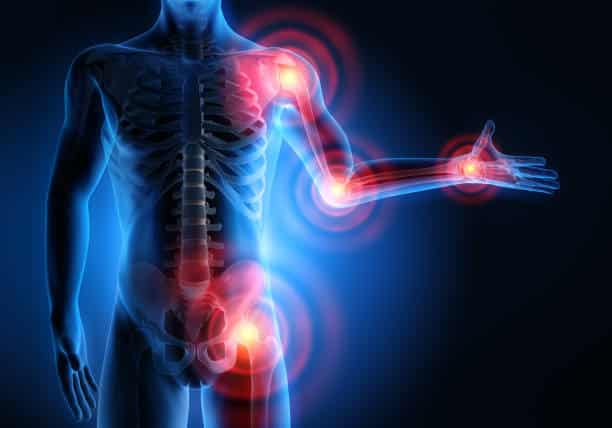As bad as it sounds, inflammation is a protection mechanism that humans have developed to combat injuries and foreign agents. Fever, chills, muscle stiffness, fatigue can all be signs that your body is fighting inflammation. Successful treatment is important not only for getting rid of invaders but for proper healing and restoration of various tissue functions and structures. Leaving inflammation unattended can damage various organs and lead to serious medical conditions. What are the types of inflammation? What causes them? What are the signs of chronic inflammation and its possible treatments? Let’s dive into this article to find out.
TYPES OF INFLAMMATION
There are two types of inflammation: acute and chronic. Acute inflammation is a response to tissue damage caused by trauma or invasion of foreign materials and organisms. It’s relatively short in duration, lasting for minutes or a few days in certain cases. During acute inflammation, the body instantly releases fluids, blood plasma proteins, and leukocytes, and increases the blood flow to the damaged area to prevent inflammation, ingest invaders and clean up the injury. This is a fascinating and complex defense cycle that most of the time gets resolved within a week’s period.
If left untreated, acute inflammation can develop into chronic. However, there are also other contributors to chronic inflammation. Once developed, it can last from several months to even years. Over this period it often manages to cause major damage, leading to a number of complications and even serious medical problems.
CAUSES OF CHRONIC INFLAMMATION
Many don’t realize that what makes inflammation so serious is its ability to cause not only disability but also mortality. Some of the diseases related to chronic inflammation include cardiovascular disease, cancer, diabetes mellitus, chronic kidney disease, non-alcoholic fatty liver disease, and autoimmune and neurodegenerative disorders. After this list, it is no surprise that chronic inflammatory diseases are the leading cause of death worldwide, accounting for more than 50% of deaths! According to the WHO, chronic diseases are one of the greatest threats to human health.

Chronic inflammation can have different causes. These can be social, environmental, and lifestyle factors that increase the chances of developing inflammation. Evidence also indicates that chronic inflammation can be related to early development and childhood. Eliminating the sources of inflammation from early childhood and even prenatally is important for ensuring the healthy development of a child. Other examples of risk factors for developing chronic inflammation include:
1. Untreated or recurrent episodes of acute inflammation. This means being exposed to infectious organisms such as protozoa, fungi, and other parasites for a prolonged period of time or periodically. If left unattended, acute inflammation can develop into chronic.
2. Continued exposure to harmful compounds. Chronic inflammation can develop when the body continuously ingests small amounts of toxic materials, such as chemicals and pollutants. This is often a problem for people working or living in an environment that contains such substances or industrial chemicals.
3. Presence of an autoimmune disorder. As a result of autoimmune disease, your body might confuse your own cells for harmful particles and starts attacking and destroying them. As a result, healthy tissue might deteriorate, which can cause a number of diseases, including rheumatoid arthritis (RA) and systemic lupus erythematosus (SLE).
4. Damage to anti-inflammation cells. It is no surprise that without proper functioning of the defense cells in our body, people often develop recurrent and persistent inflammation which becomes hard to treat.
5. Individual risk factors. Other risk factors include older age, obesity, smoking, stress, etc. With age, the number of inflammatory molecules in our bodies tends to increase (due to possible reasons like accumulation of free radicals and visceral body fat, and mitochondrial dysfunction). An increase in BMI is associated with higher exposure to chronic inflammation, just like it happens with smoking. Finally, sleep disorders and irregularities also increase the risk of developing chronic inflammation.
6. Food Sensitivities. Food sensitivities can cause the body to have more inflammation, especially in the digestive tract. Bloating, swelling, weight problems, digestive issues, aches, and pains can all be symptoms of food sensitivities. Eliminating the top food allergens (milk, eggs, fish, seafood, wheat, peanuts, gluten, soybeans) can often be helpful in eliminating food allergies.
EFFECTS OF CHRONIC INFLAMMATION
While there are many different irritants causing an inflammatory response, the body’s reaction is quite standard. The first step involves recognizing stimuli using the receptors on the surface of cells. This is followed by the activation of the defense cascade which involves the release of different types of defense proteins. As the body needs to supply more nutrients to combat the inflammation, the body goes into a sort of “power-saving” mode. As a result, people might experience tiredness, sadness, a decline in appetite and sex drive, changes in sleep patterns, etc.
Other symptoms of chronic inflammation include body pain, depression, anxiety and mood disorders, weight changes, GI complications. To read more about the effects of chronic inflammation on various body parts, including the brain, cardiovascular system, muscle, GU tract, lungs, thyroid, bones, kidneys, and skin click here.
INFLAMMATION ASSESSMENT & TREATMENT

Since our bodies are not designed to exist in a continuous state of chronic inflammation, it is essential to get a timely diagnosis and eliminate the root cause of inflammation. Some blood tests can be helpful in diagnosing chronic inflammation. The C-Reactive Protein (CRP) test, ESR (Erythrocyte Sedimentation Rate), and plasma viscosity (PV) tests are generally used by doctors to diagnose inflammation. All of these markers can be raised in many inflammatory conditions, ranging from simple causes like tissue injury or abscess, all the way to more serious causes like Crohn’s Disease and Rheumatoid Arthritis. Other functional medicine bio-markers to help identify inflammation are: calprotectin (stool), lactoferrin (stool), homocysteine(blood), ferritin (blood), 8-OHDG (urine), etc.
Dr. Dempster, ND provides an inflammation assessment where blood work is drawn and sent to a lab for analysis. This provides a means for Dr. Dempster, ND to analyze and identify inflammation that may be contributing or leading to a condition.
An effective way to combat chronic inflammation can be IV Vitamin Therapy. High-dose Vitamin C is one popular type of IV therapy, as it is a natural antioxidant and also plays a key role in making collagen for the body. When vitamin C breaks down in the body, it produces hydrogen peroxide, which can be helpful in eliminating pathogens and even possibly providing support for cancer patients. Since your body cannot produce Vitamin C on its own, it’s important to make sure your intake is plentiful to help combat issues like chronic inflammation.
At The Dempster Clinic, we are proud to offer a wide range IV Vitamin therapy treatments to our patients. How can IV vitamin therapy help combat chronic inflammation?
- Reducing toxicity levels in the body. Vitamins help the body detox properly, reducing inflammation as time goes on. When there are less toxins in the body, it doesn’t have to work as hard to eliminate them.
- Immune support. Vitamins improve our immune system’s ability to help neutralize viral, bacterial, and even fungal infections. They are extremely helpful in eliminating pathogens naturally. By removing these foreign invaders, the body has a better chance of naturally returning to a state of balance while also reducing the body’s inflammatory response.
- Reducing CRP and pro-inflammatory cytokines in the body. High-dose IV vitamin C therapy has been proven to reduce both CRP and cytokines in cancer patients. Reducing and eliminating inflammation is a huge part of the body’s healing process back to health.
In general, inflammation in the body means there is some type of problem, and reducing it is going to be helpful to the overall health of the patient. Even if you aren’t sure of what the root cause of your illness is, working with us will help you regain your health and live a healthier life. IV Vitamin therapy can benefit pretty much anyone, so taking part will only help ensure overall better health. You can also read more about different ways you can reduce inflammation here.


